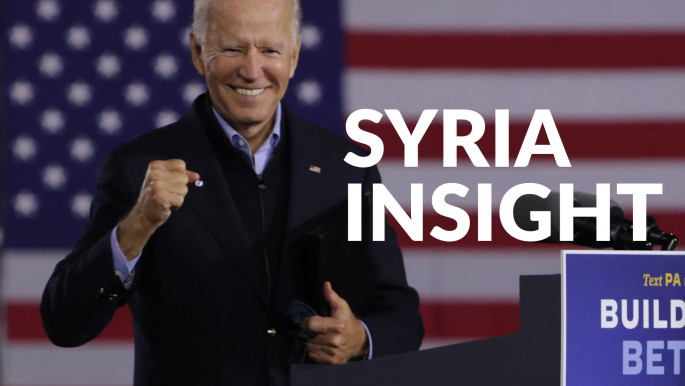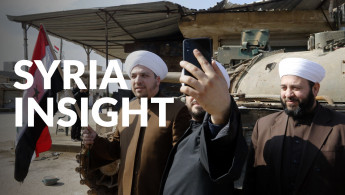Syria Insight: The Assad regime's battle for religious legitimacy
Syria Insight: The Assad regime's battle for religious legitimacy
Bashar Al-Assad is once again trying to claim the state's legitimacy in the religious sphere.
7 min read
Assad has often claimed that the state best represents Islam. [Getty]
Speaking last week to leading Sunni religious figures about the role of Islam in society, Bashar Al-Assad again attempted to claim religious legitimacy for his regime amid an ongoing war with opposition factions.
Never shy to splice his own philosophical musings into his speeches, Assad spoke at length about religion being a key underpinning of moral life and how Islam also relates to the war in Syria.
The conflict has been frequently described in regime propaganda in religious terms, as a battle between the legitimate representatives of Islam (i.e. the state) against foreign forces, who have used religion to destabilise Syria.
The conflict has been frequently described in regime propaganda in religious terms, as a battle between the legitimate representatives of Islam (i.e. the state) against foreign forces, who have used religion to destabilise Syria.
This was a comparison Assad repeated again last week in his lecture to officials from the ministry of religious affairs and members of the ulama.
"Religion, which has been descended to be a tool for the development of societies has instead been used as a tool to ruin these societies… here I want to assimilate the situation in the world we live in as a large ocean, huge waves that strike in all directions, strike through terrorism," Assad said, according to Syrian state news.
Religious legitimacy
Religious legitimacy
Assad's claim that the state best represents Islam has been an important element of the regime's rhetoric throughout the war, an attempt to legitimise the Baath Party's rule to Syria's Sunni majority.
"There are many reasons why the Assad regime has survived the war, but one is the flexibility of authoritarianism and his ability to manipulate and mobilise public support," explains Dr. Rahaf Aldhoughli, lecturer on Middle East politics at Lancaster University.
"It is not only relying on the Russian and Iranian military support, but also being able to manipulate ideology itself."
"It is not only relying on the Russian and Iranian military support, but also being able to manipulate ideology itself."
When anti-government demonstrations first began in 2011, protesters would often congregate outside mosques following Friday prayers, one of the few places in Syria where groups could gather, Aldhoughli points out.
This and other factors in the uprising have made Islam a sensitive subject for the regime, with the opposition dismissed as practicing a warped interpretation of Islam that is alien to Syria.
 |
As the protests became more religious in their identity, the more the regime began to say they do not represent Islam, we do - Dr. Rahaf Aldhoughli |
 |
Islam has featured more prominently in Assad's speeches post-2011, often with the ulama at hand to stress the religious legitimacy of the regime to Syria's Sunni majority and downplay the Baath Party's secular foundations.
"The regime saw that they needed to mobilise support on all fronts… it would be wrong to think that the regime does not care about religious legitimacy. Ok, they don't care about it a lot, but there is a minimum standard that would allow them to fight on so many levels," said Aldoughli.
"Since 2014, Assad’s rhetoric has departed secularism and deployed an entrenched religious tone, claiming to be the protector of Islam. Assad insisted in many speeches addressed to ulama between 2014 and 2020 that the Baath state is responsible to protect the true form of Islam, one that is free of extremism and sectarianism."
As resistance to his rule built, Assad said he wanted to promote the "Mohamedian message" in Islam, while at the same time insisting that the ulama issue fatwas against protesters, Aldhoughli said.
"This adoption of religious tone comes as one of Assad's authoritarian measures to solidify his rule and ensure his survival. Yet, it is unprecedented in the Syrian context where Assad is seen preaching ulama on theological concepts, such as what constitutes permissible vs impermissible Islam, or what constitutes true belief vs kufir."
The Othman Mosque speech was another example of Assad's attempts to cater secularism to the growing religiosity of his recent messages.
As resistance to his rule built, Assad said he wanted to promote the "Mohamedian message" in Islam, while at the same time insisting that the ulama issue fatwas against protesters, Aldhoughli said.
"This adoption of religious tone comes as one of Assad's authoritarian measures to solidify his rule and ensure his survival. Yet, it is unprecedented in the Syrian context where Assad is seen preaching ulama on theological concepts, such as what constitutes permissible vs impermissible Islam, or what constitutes true belief vs kufir."
Twitter Post
|
The Othman Mosque speech was another example of Assad's attempts to cater secularism to the growing religiosity of his recent messages.
"Some believe that one of the requirements of secularism, or the essence of secularism, is separating religion from the state - this is wrong, there is no relation between secularism and separating religion from the state," Assad said, according to Syrian journalist Asser Khatab.
Secularism
Assad's current discourse highlights a shift away from remarks he made to Western journalists before the war, when he said a challenge of his rule was maintaining a secular Syria, to promoting a vague notion of religious tolerance.
"After 2011, we see Assad return to the religious front, describing the conflict as related to terrorism… we also see a different interpretation of secularism from Assad, which is about not judging others' beliefs and he still maintains that the identity of the state is an Islamic one," said Aldhoughli.
In 2017, Assad dismissed opposition claims that the Syrian state lacked an Islamic identity by stressing many of the country's laws were still based on Sharia.
"This was particularly addressed to the Sunni majority, he was saying 'look we are following Sharia law'… now Assad discusses the state having a particularly Sunni identity," Aldhoughli said.
This pattern changed after around 2017 when the regime - backed by Iran and Russia - recaptured much of Syria's urban centres, said Dr. Thomas Pierret, senior researcher at CNRS-Ireman, Aix-en-Provence.
"His speech last week was extremely opportunist and a targeted discourse. He was addressing religious scholars in a mosque and that has no consequences for anyone outside that sitting," he told The New Arab.
"It is true he was talking in an unusual way, more religious than usual, but I feel that it was an attempt to offset recent developments that have been humiliating for Sunni religious elites."
"It is true he was talking in an unusual way, more religious than usual, but I feel that it was an attempt to offset recent developments that have been humiliating for Sunni religious elites."
More authority has been granted to the ministry of religious affairs, which is directly controlled by the regime, at the expense of the ulama who have been significantly weakened during the war.
"The grand mufti used to be a self-standing authority, so this law meant he was selected by the ministry and so subject to their authority," said Pierret.
Although parliamentary votes are a meaningless exercise in authoritarian Syria, last July's elections heaped further humiliation on the ulama with not a single member of the religious establishment being elected to parliament while the traditional Sunni merchant class also lost much of its presence.
 |
If you look at the structure of it the Sunni religious elite are in pretty bad shape, probably the weakest in the history of this regime - Dr. Thomas Pierret |
 |
"It is the first since 1973 that this has happened, they've all gone and been replaced by militia leaders and profiteers," said Pierret.
"So, if you look at the structure of it the Sunni religious elite are in pretty bad shape, probably the weakest in the history of this regime."
"So, if you look at the structure of it the Sunni religious elite are in pretty bad shape, probably the weakest in the history of this regime."
Weakened ulama
Syria's once respected ulama are now a shadow of their former self, particularly after the assassination of renowned Muslim scholar Mohammed Said Ramadan Al-Bouti in 2013, and the exile of some of his most prestigious colleagues.
Before 2011, renowned Muslim scholar Mohammed Said Ramadan Al-Bouti and others made a "grand bargain" with Assad, granting the regime the backing of the Sunni religious establishment in exchange for minor concessions.
 |
|
| Syria Insight: What to expect under the Biden administration |
"He was pushing that argument as part of bargain with the regime - we are going to help you de-legitimise human rights association and any political opposition promoting human rights, but in exchange you will support our conservative agenda," Pierret commented.
Sunni religious leaders have further lost their political relevance in the war, Pierret said, with the regime more concerned with rewarding militia leaders rather than the members of Syria's disempowered ulama.
The regime will continue to reach out to religious leaders and Sunni elites, such as coopting junior clerics through initiatives such as the Youth Religious Team.
Yet these groups have lost their political relevance since defeats for the opposition, Pierret said, with the regime more concerned with appeasing other key figures, particularly in smuggling and the military.
"Assad is still cultivating this constituency, but he doesn't need them as much as he used to do, so has limited their influence to a societal realm; politically, they are pretty much irrelevant," said Pierret.
"There are now far more powerful people for the regime to cosy up to, such as war profiteers and militia leaders."
Syria Insight is a regular feature from The New Arab. To get Syria Insight in your inbox each edition, sign up here.
Paul McLoughlin is a news editor at The New Arab.
Follow him on Twitter: @PaullMcLoughlin
Yet these groups have lost their political relevance since defeats for the opposition, Pierret said, with the regime more concerned with appeasing other key figures, particularly in smuggling and the military.
"Assad is still cultivating this constituency, but he doesn't need them as much as he used to do, so has limited their influence to a societal realm; politically, they are pretty much irrelevant," said Pierret.
"There are now far more powerful people for the regime to cosy up to, such as war profiteers and militia leaders."
Syria Insight is a regular feature from The New Arab. To get Syria Insight in your inbox each edition, sign up here.
Paul McLoughlin is a news editor at The New Arab.
Follow him on Twitter: @PaullMcLoughlin



